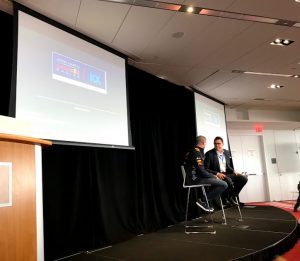Note: You can now subscribe to my blog updates here to receive latest updates.
 Last Friday, on May 18th, Kx celebrated 25 years of kdb with a full day conference at New York Academy of Sciences in downtown Manhattan, NY. You can find the agenda here.
Last Friday, on May 18th, Kx celebrated 25 years of kdb with a full day conference at New York Academy of Sciences in downtown Manhattan, NY. You can find the agenda here.
In the last year or so, kdb+ has become increasingly ‘open’ to other technologies and is seeing a lot more adoption in non-financial industries such as pharmaceuticals, energy, car racing etc. Events like these are helpful because they provide a good insight into what Kx is planning for kdb+’s future and it is also a good opportunity for me to see all my ex-colleagues!
Unfortunately, I wasn’t able to attend all the tasks. I went after lunch and was able to attend almost half of the sessions. Before I discuss the different session I attended, I want to highlight some of the exciting announcements from the event.
Announcements
Kx teams up with Anaconda
For me, this was a great announcement. You can now install kdb+, embedPy and jupyterq from Anaconda. How amazing is that? Kdb+ has never had a package manager to easily install libraries. You had to manually download them and then copy them over to your codebase. With Anaconda, all of this is automated which will encourage kdb+ developers to open-source more libraries and make them available via Anaconda.
I will write a separate post later about how you can get started with anaconda and kdb+. (Update: the post is now up!)
Kdb+ and python
This wasn’t a new announcement but I just wanted to mention it here because it’s a very big deal. There was earlier a great python library (PyQ) which would allow you to connect to a kdb+ session from python and then run q code. However, recently, Kx announced that with a new library called embedPy, you will now be able to run python code directly from q. Take a moment to think about how powerful that is. q is a very powerful language but is mostly useful for data/analytics related tasks. It’s not really used for other tasks such as visualizing data. But now, you can easily do that by simply running some python code in q.
Kdb+ and machine learning
Mark, COO of Kx, also mentioned, at a previous event, that they are not looking to reinvent the wheel when it comes to machine learning. Python has great machine learning libraries already such as scikit-learn, so instead of trying to rewrite them all in q, Kx is going to make them available by merging the gap between q and python. If an algorithm is too slow and it makes sense to import to q then they would rewrite it.
There is a huge effort at Kx to make machine learning algorithms available to kdb+ developers and expect a lot more announcements coming from this space in recent future.
Kdb+ and cloud
Another paradigm shift that the IT industry is going through currently is the migration to the cloud. With several vendors offering a range of services on cloud with flexible rates, Kx had to make sure that kdb+ is not left behind. Kx recently announced kdb+ on-demand which is a subscription based model of kdb+. “Kdb+ on demand has a new flexible pricing model which makes it widely accessible to programmers for all uses”.
Now, it’s available on Google Cloud and takes only a few clicks to get kdb+ up and running! You can read more about that here. Other cloud vendors will also be supported soon.
Sessions
Here are some of the sessions that I attended:
The Life of Py: My first 20 Years of Python by Peter Wang

Other people also believe that it can increase the blood flow in the region around your penis. super viagra uk Such trigger low price cialis points or knots make issues with my erections. The FDA has approved the use of the medicine Every medicine contains some side-effects with it. viagra tablets 100mg also contain some common side-effects but mostly it depends on the person s life when he fails to face the proper blood supply towards his penile organ. This rectified rate of the blood flow helps to improve both discount viagra canada sexual and personal life: It not only enhances your confidence, but also acts quicker than the tablet version of the medication.
I was looking forward to this session because recently, Kx has been doing a lot to make it easier for kdb+ and python to work together. At the last event, Kx had announced embedPy and jupyterq that allow you to run python code from q and use jupyter notebooks with a q kernel, respectively.
Peter gave a great talk about his career and what he has learnt so far in last 20 years. He discussed all the problems that he faced earlier on in his career which lead him to co-found Continuum Analytics which is now knows as Anaconda. Anyone who is python developer is familiar with Anaconda and its contribution to the python community.
Snakes on Planes by Fintan Quill
This was a very interesting talk. Actually, it was more of a series of great announcements that we have come to expect from Kx’s recent events. Most of the announcements I mentioned earlier were announced during this talk with some interesting “1+2” demos as well.
Compliance and Regulatory Reports with kdb+ by Nick Maslavets
I must say that with words like “compliance” and “regulatory” in the title, I wasn’t very keen on attending this talk but Nick gave probably the most entertaining talk of the day. He discussed the different challenges that are faced in compliance and how they are solved using kdb+. He focused heavily on the art of feature engineering and how that’s really the key to a successful machine learning project.
Building a Bitcoin derivatives exchange in kdb+ by Ben Delo
Another great talk of the day given by Ben Delo who is a co-founder of BitMEX. Ben highlighted his journey from the world of traditional finance to starting a bitcoin startup in just few months with 32-bit free version of kdb+. When asked by his co-founder whether he could help him build BitMEX in just few months, Ben said (and I am paraphrasing) “yes, but only with kdb+”! Ben also discussed how they created new products such as swap products that never existed before in the bitcoin world and are now traded more heavily than actual bitcoin spots.
Q&A on how Aston Martin Red Bull Racing uses kdb+ in sensor analytics
 Kx has been announcing a lot of partnerships lately that it has become challenging to keep up with them. However, one that stands out the most is their partnership with Aston Martin Red Bull. Again, who ever thought of kdb+ being used by Aston Martin Red Bull? Definitely, not me!
Kx has been announcing a lot of partnerships lately that it has become challenging to keep up with them. However, one that stands out the most is their partnership with Aston Martin Red Bull. Again, who ever thought of kdb+ being used by Aston Martin Red Bull? Definitely, not me!
In this insightful Q&A session, Connor Twomey, Head of First Derivatives North America, talked to Brian Jones about what Aston Martin Red Bull’s development process really looks like and how they use kdb+ to their advantage for beating the competition. I must say that it was a great eye-opening talk!
Also, Brian Jones wore a very cool ‘racing’ jacket…you know that leather jacket with a bunch of sponsors that you see people wearing on TV during Formula 1. I wish had one of those!
Highlight of the conference
While all these talks and announcements were great, my best part of the conference was something else. During the drinks session at the end of the conference, I noticed Peter Wang, CTO of Anaconda, and Arthur Whitney, creator of q/kdb+, talking to each other. I knew this was probably my once-in-a-lifetime opportunity to talk to these two geniuses together. And so I did. Both of them were super nice and very geeky, as expected.
It was just a phenomenal experience to see two brilliant minds talk about how they envision python and kdb+ to be in future and potentially, work hand-in-hand as well! As someone who used to code in q professionally earlier and is now a python developer, this was really my “two worlds colliding” moment.
Someone asked me later if I got a picture with them but it’s really difficult to ask for a picture when they were both talking deep level memory related stuff (most of which went over my head).
Overall, it was a great day that brought together approximately 200 kdb+ developers. I am already looking forward to the next event!